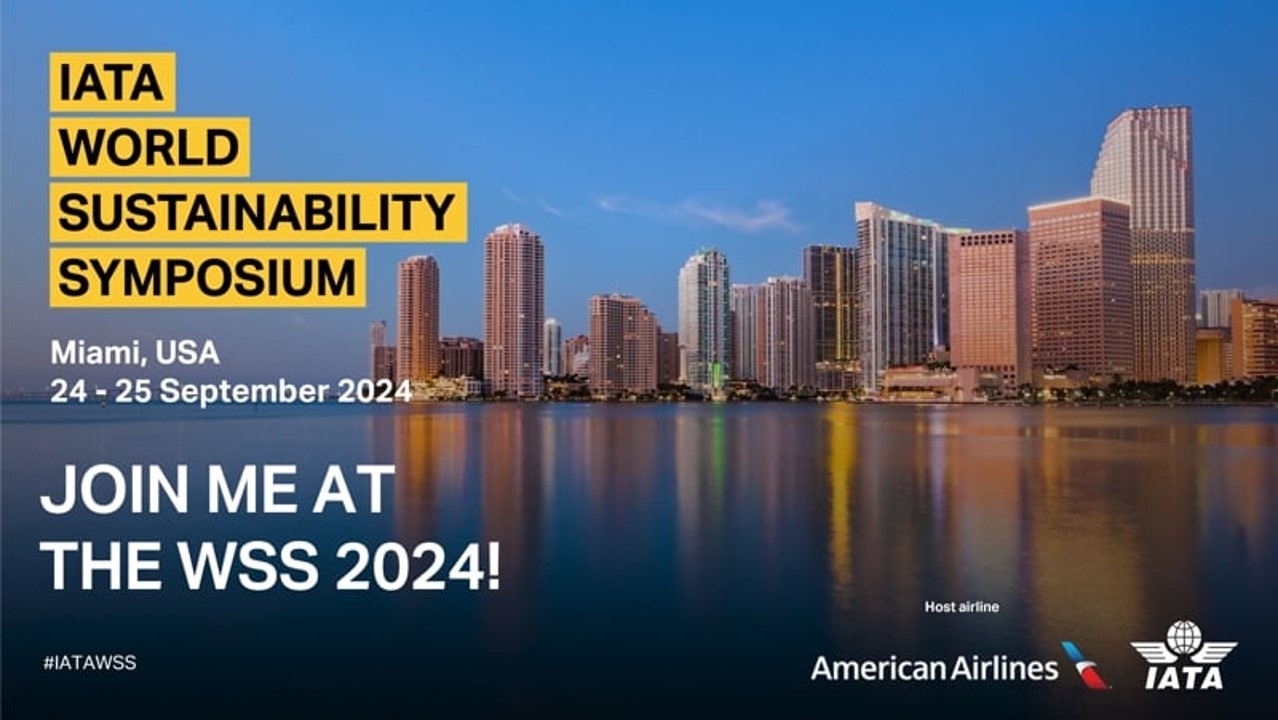The Americas, through agriculture and biofuels, will be the main provider of abundant, affordable, and sustainable raw materials for SAF production, a key tool for decarbonizing the sector.

Miami, 2 October 2024 (IICA) – The Americas are on track to become the main provider of sustainable aviation fuels (SAF), experts stated during the World Sustainability Symposium (WSS), organized by the International Air Transport Association (IATA) with the participation of the Inter-American Institute for Cooperation on Agriculture (IICA), where the path to achieving zero emissions by 2050 was discussed.
The long-term sustainability goals of the industry require collaboration across the entire value chain. This was one of the key points discussed by various stakeholders who identified the challenges, risks, and opportunities of investing in sustainability and renewable energy initiatives to promote the industry’s transition to a future of net-zero CO2 emissions.
Agustín Torroba, an international specialist in biofuels and renewable energies from IICA and Executive Secretary of the Pan-American Liquid Biofuels Coalition (CPBIO), participated in the panel “How to Enhance the Investment Appeal in Sustainability Initiatives to Support the Industry’s Transition to Net Zero Emissions,” which was moderated by Karen Walker (editor-in-chief of Air Transport World) and included Christine Cassotis (CEO of Pittsburgh Airport), Raman Ojha (President of Shell Aviation), and Brian Moran (Director of Sustainability at Boeing).
The discussion primarily focused on sustainable aviation fuels (SAF), and Torroba conveyed two main messages:
First, that the Americas, through agriculture and biofuels, will be the leading provider of abundant, affordable, and sustainable raw materials for SAF production, becoming the primary tool for decarbonizing the sector.
Second, that internationally harmonized standards on sustainability criteria for SAF certification are necessary, as directives like the European Union’s “ReFuel” could be problematic by prohibiting raw materials produced sustainably in our continent.
The EU’s ReFuel regulation is a policy that promotes SAF in Europe but bans the use of abundant and sustainable raw materials produced in the Americas, such as corn, sugarcane, and soybean oil.
For Torroba, neutrality criteria in the use of raw materials and technologies are key to developing markets based on demonstrable and science-based sustainability standards.
“Agriculture and the land-based biofuels sector in the Americas will be crucial for SAF production. When we talk about the provision of raw materials, especially biological ones, the more than 20 years of developing a massive liquid biofuels market for the land transportation sector have taught us valuable lessons that can be applied to the development of SAF,” said Torroba.
The takeaway from this event suggests that the first major lesson is that the raw materials used to produce biofuels and SAF must meet three essential characteristics: they must be affordable, abundant, and sustainable.
This is because abundant raw materials are needed to meet the scale of SAF production plants; they must be affordable to keep costs as low as possible and prevent price increases for consumers; and they must adhere to certifiable, science-based sustainability criteria to ensure that SAF outperforms fossil fuels in environmental and social terms.
Neutrality criteria in the use of raw materials and technologies are essential for the development of markets based on demonstrable, science-based sustainability standards.
The standardization of sustainability criteria can facilitate economies of scale in SAF production, making it more profitable and attractive for investment. By aligning standards and reducing certification costs, countries can boost confidence in SAF sustainability and help create a dynamic, reliable, and abundant market.
“The other challenge is that the development of public policies and regulations in the region is lagging behind. However, I am more optimistic about this point because the absence of public policies in such a new field can be an advantage, allowing us to learn from other countries that have made progress and apply lessons learned in policy design,” concluded Torroba.
More information:
Institutional Communication Division.
comunicacion.institucional@iica.int











